(完整word版)动名词
(完整word版)中考英语语法重点:句子成分、基本句、状语、宾语、定语从句、it

一、句子成分:1.主语:主语(Subject)是一个句子所叙述的主体,一般位于句首。
主语可由名词、代词、数词、不定式、动名词、名词化的形容词和主语从句等表示。
例如:The sun rises in the east。
(名词)He likes dancing. (代词)Twenty years is a short time in history。
(数词)Seeing is believing. (动名词)To see is to believe. (不定式)What he needs is a book. (主语从句)2. 谓语谓语 (Predicate) 说明主语所做的动作或具有的特征和状态。
动词在句中作谓语,一般放在主语之后。
谓语的构成如下:1、简单谓语:由一个动词或动词短语构成。
如:He practices running every morning。
The plane took off at ten o'clock。
2、复合谓语:(1)由情态动词或其他助动词加动词原形构成,或由各种时态构成。
如:You may keep the book for two weeks.He has caught a bad cold.(2)由系动词加表语构成。
如:We are students.注意:谓语与主语在人称与数方面要保持一致3.表语表语(Predicative)用以说明主语的性质、特征、状态与身份,它一般位于系动词(如be, become, get, look, grow, turn, seem等)之后.例如:He is a teacher。
注意:系动词(Linking verb)用于连接主语和表语,说明主语的状态,性质特征和身份等常见的系动词有: be, sound(听起来), look(看起来), feel(摸起来),smell(闻起来),taste(尝、吃起来), remain(保持,仍是), feel(感觉)….It sounds a good idea。
完整word版,动名词翻译练习题
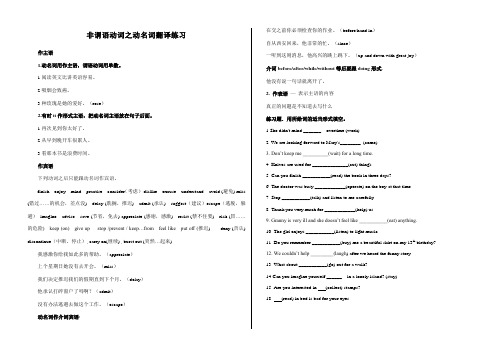
非谓语动词之动名词翻译练习作主语1.动名词用作主语,谓语动词用单数。
1.阅读英文比讲英语容易。
2.吸烟会致癌。
3.种玫瑰是她的爱好。
(rose)2.有时it作形式主语,把动名词主语放在句子后面。
1.再次见到你太好了。
2.从早到晚开车很累人。
3.看那本书是浪费时间。
作宾语下列动词之后只能跟动名词作宾语。
finish enjoy mind practise consider(考虑)dislike excuse understand avoid (避免) miss (错过……的机会,差点没) delay (耽搁,推迟) admit (承认) suggest(建议)escape(逃脱,躲避)imagine advise save (节省,免去) appreciate (感谢,感激) resist (禁不住要) risk (冒……的危险) keep (on) give up stop /prevent / keep…from feel like put off (推迟) deny (否认) discontinue(中断、停止), carry on(继续) , burst out (突然…起来)我感激你给我如此多的帮助。
(appreciate)上个星期日她没有去开会。
(miss)我们决定推迟我们的假期直到下个月。
(delay)他承认打碎窗户了吗啊?(admit)没有办法逃避去做这个工作。
(escape)动名词作介词宾语: 在交之前你必须检查你的作业。
(before/hand in)自从西安回来,他非常的忙。
(since)一听到这则消息,他高兴的跳上跳下。
(up and down with great joy)介词before/after/while/without等后要跟doing形式.他没有说一句话就离开了。
2. 作表语—表示主语的内容真正的问题是不知道去写什么练习题.用所给词的适当形式填空。
1.She didn't mind _______overtime.(work)2. We are looking forward to Mary's________. (come) .3. Don’t keep me __________(wait) for a long time.4. Knives are used for ______________(cut) things.5. Can you finish ___________(read) the book in three days?6. The doctor was busy ____________(operate) on the boy at that time.7. Stop ___________(talk) and listen to me carefully.8. Thank you very much for ____________(help) us.9. Granny is very ill and she doesn’t feel like ___________(eat) anything.10. The girl enjoys ___________(listen) to light music.11. Do you remember ___________(buy) me a beautiful skirt on my 13th birthday?12. We couldn’t help _________(laugh) after we heard the funny story.13. What about ___________(go) out for a walk?14.Can you imagine yourself ______in a lonely island? (stay)15. Are you interested in (collect) stamps?18. (read) in bed is bad for your eyes.Reading English is easier than speaking it. 。
(完整word版)常考功能动词总结

(完整word版)常考功能动词总结G开头的功能动词:介词+动名词+动词in Gang kommen /开始运行etw。
in Gang setzen /使运作,使启动etw。
in Gebrauch nehmen= gebrauchen利用,使用auf einen Gedanken kommen /得出一个想法ins Gedränge geraten /陷入窘境jn in Gefahr bringen= gefährden置人于险境in Gefahr geraten= ge fährdet werden陷入险境in Gefangenschaft sein= gefangen sein被俘(状态)in Gefangenschaft geraten= gefangen werden被俘(过程)jn außer Gefecht setzen /使失去战斗力etw. ins Gefecht führen /提出辩论im Gegensatz stehen= gegensätzlich sein与……对立,矛盾etw. zur Geltung bringen /使发挥作用auf den Geschmack kommen /对……逐渐感兴趣ins Gespräch kommen= sprechen开始交谈aus dem Gleichgewicht kommen /失去平衡G开头的功能动词:动名词+动词+介词Gebrauch machen+von= gebrauchen使用sich Gedanken machen+über= denken考虑,对……的想法(完整word版)常考功能动词总结Gefallen finden+an= gefallen喜欢ein Gefühl haben+von= fühlen有……的感觉die Garantie bekommen+auf= garantiert werden得到担保die Garantie geben+auf= garantieren给予保修Gerechtigkeit üben+gegen= gerecht sein对……公正Gespräch führen+mit= sprechen进行谈话Gewicht legen+auf /重视Groll hegen+auf= gerollen恼怒,心怀恼火H,I,J开头的功能动词:介词+动名词+动词jn in Haft nehmen= verhaften拘捕in Haft sein/sich in Haft befinden= verhaftet sein在押jn/etw。
(完整word版)英语语法基础入门

英语基础语法知识第一节词类和句子成分一、词类能够自由运用的最小语言单位叫词。
根据词的形式、意义及其在句中的作用所作的分类叫词类(parts of speech)。
英语的词通常分为十大类,即名词、冠词、代词、数词、形容词、副词、动词、介词、连词和感叹词。
现分别叙述如下:(一)名词名词(noun)是表示人、事物、地点或抽象概念的名称。
例如:foreigner外国人soap 肥皂Newton牛顿law 法律freedom自由peace和平英语名词可分为两大类:1。
普通名词(common noun)是某一类人、事物、某种物质或抽象概念的名称。
例如:teacher教师market市场rice大米magazine杂志sound声音production生产2。
专有名词(proper noun)是特定的某人、地方或机构的名称。
专有名词的第一个字母必须大写。
例如:Hemingway海明威Russia 俄罗斯New York 纽约United Nations联合国名词又可分为可数名词(countable noun)与不可数名词(uncountable noun)两种。
可数名词有单、复数之分。
绝大多数名词的复数形式的构成是在单数名词的后面加-s或-es。
例如:shop→shops商店bus→buses 公共汽车library→libraries图书馆toy→toys玩具leaf→leaves树叶英语中有一些名词的复数形式是不规则的。
例如:man→men男人tooth→teeth牙齿datum→data数据有关名词复数形式构成的具体规则,请参阅有关的英语语法书。
(二)冠词冠词(article)放在名词之前,帮助说明该名词所指的对象。
冠词分为不定冠词(indefinite article)和定冠词(definite article)两种。
不定冠词为a/an,用在单数名词之前,表示某一类人或事物的“一个”。
a用在以辅音开头的名词之前,an用在以元音开头的名词之前。
(完整word版)动名词练习题(附答案)

动名词练习题(附答案)1) Mark often attempts to escape ____ whenever he breaks traffic regulations.A) having been fined B) to have been finedC) to be fined D) being fined2) My wife said in her letter that she would appreciate ____ from you sometime.A) to have heard B) to hearC) for hearing D) hearing3) The thief took away the woman's wallet without____.A) being seen B) seeingC) him seeing D) seeing him4) People appreciate ____wit him because he has a good sense of humor. (CET-4 1998,1)A) to work B) to have workedC) working D) have working5) I've enjoyed ____ to talk with you.A) to be able B) being ableC) to been able D) of being able6) No one can avoid ____ by advertisements.A) to be influenced B) being influencedC) influencing D)having influence7) They are considering ____ before the prices go up.A) of buying the house B) with buying the houseC) buying the house D) to buy the house8) He thought that ____.A) the effort doing the job was not worth B) the effort was not worth in doing the jobC) it was not worth the effort doing the job D) it was not worth the effort by doing the job9) If I had remembered ____ the door, the things would not have been stolen.A) to lock B) lockingC) to have locked D)shavings locked10) Your shirt needs ____. You'd better have it done today.A) iron B) to ironC) ironing D) being ironed11) You can't help ____ commercials; every few minutes the program is interrupted to give you one advertisement or another.A) to hear B) to be heardC) hearing D) with hearing12) My transistor radio isn't working. It ____.A) need repairing B) needs to repairC) needs repairing D) need to be repaired13) It is no use ____ me not to worry.A) you tell B) your tellingC) for you to have told D)shavingstold14) He is very busy ____ his papers. He is far too busy ____ callers.A) to write...to receive B) writing...to receiveC) writing...receiving D) to write...for receiving15) The suspect at last admitted ____ stolen goods but denied ____ them.A) receiving...sellingB) to receive...to sellC) to receiving...to sellingD) to have received...to have sold16) She apologized for ____ to come.A) her not being able B) her being not ableC) not being able D) that she's not able to17) I really appreciate ____ to help me, but I am sure that I can manage by myself.A) you to offer B) that you offerC) your offering D) that you are offering18) Please stop ____, boys, I have something important to ____ you.A) saying ...talk B) telling ... sayC) talking ...speak D) talking ... tell19) Tony, would you go and see if Sam has any difficulty ____ his tape recorder?A) to fix B) fixing C) for fixing D) fix20)"Why isn't Nancy going to meet us?""It's my fault. I forgot allabout ____ her."A) telephoning to B) to telephoneC) to telephone to D) the telephoning to21)"Why were you late?""I had a hard time ____ up this morning."A) to get B) get C) got D) getting22) I remember ____ to help us if we ever got into trouble.A) once offering B) him once offeringC) him to offer D) to offer him23) John regretted ____ to the meeting last week.A) not going B) not to goC) not been going D) not to be going24) It is difficult to get used ____ in a tent after a soft, comfortable bed to lie on.A) sleep B) to sleepingC) slept D) to sleep25) He gives people the impression ____ many poems.A) of written B) to have writtenC) of being written D) to write26) Do you feel like ____ out or would you rather ____ dinner at home?A) going...to have B) to go...to haveC) to go...having D) going...have27) Prior to ____ the formal speech, first he will introduce himself.A) delivering B) deliverC) being delivering D) being delivered28)I don't mind ____ by bus, but I hate ____ in queues.A) to travel...standing B) traveled...standingC) traveling...to stand D) traveling...standing29) What about ____ double quantities of everything today? We have hardly time to go____ next week.A) buying...to shop B) buy...shoppingC) buying...shopping D) to buy...shopping30) We had some trouble ____ the house and nobody seemed ____ where it was.A) in finding...knowing B) finding...to knowC) to find...knowing D) to find...to know31) We can't imagine ____ in the entrance examination, for she has never been to school.A) she succeeding B) her succeedingC) she succeed D) her to succeed32) I don't like ____ at me.A) them laughing B) their laughC) them laugh D) them to have laughed33) We suggested ____ in hotels but the children were anxious ____ out.A) sleeping...to camp B) sleeping...campingC) to sleep...to camp D) to sleep...camping34)I have no objection ____ the evening with them.A) to spend B) to spending C) of spending D) spending35) After ____ for the job, you will be required to take a language test.A) being interviewed B) interviewedC) interviewing D) interviewed36) The match was cancelled because most of the members ____ a match without a standard court.A) objected to B) were objected to haveC) objected to have D) were objected to having37) Jean did not have time to go to the concert last night because she was busy ____ for her examination.A) to prepare B) to be preparedC) preparing D) being prepared38) It is no good ____ remember grammatical rules. You need to practise what you have learned.A) trying to B) to try toC) try to D) tried to39) After ____ him better, I regretted ____ him unfairly.A) getting to know...to judgeB) getting to know...to have judgedC) getting to have know...judgingD) getting to know...having judged40) He is looking forward to ____ his holiday in Britain.A) spend B) have spentC) spending D) been spending41) Before ____ the house, you should get a surveyor____ over it.A) buying...looking B) bought...to lookC) buying...to have looked D) buying...to look42) In some countries people favor ____ together even though there is much more space.A) to stay B) stayC) staying D) stayed43)"Why was Fred so upset?""He isn't used ____ criticized."A) be B) to be C) to being D) been44) It's no use ____ to get a bargain these days.A) to expect B) expectingC) wanting D) you expect45)"Why were you so late for work today?""____ to the office was very slow this morning because of the traffic."A) Driving B) I droveC) To drive D) That I drove46) It was impolite of him ____without ____good-bye.A) to leave, saying B) leaving, to sayC) to leave, to say D) leaving, saying47) He kept ____to his parents.A) putting off to write B) to put off to writeC) putting off writing D) to put off writing48) I'll go with you after I get through with ____the house.A) cleaning B) to cleaningC) to be cleaned D) cleaned49) With apples at 25 cents a pound, we couldn't resist ____four pounds.A) to take B) took C) taking D) have taken50 )How can you keep the machine ____when you are away?A) run B) to run C) running D) being run动名词部分练习题答案:1)D 2)D 3)A 4)C 5)B 6)B 7)C 8)C 9)A 10)C 11)C 12)C 13)B 14)B 15)A 16)A 17)C 18)D 19)B20)A21)D 22)B 23)A 24)B 25)C 26)D 27)A 28)D29)C 30)B31)B 32)A 33)A 34)B 35)A 36)A 37)C 38)A39)D 40)C41)D 42)C 43)C 44)B 45)A 46)A 47)C 48)A49)C 50)C。
(完整word版)十大词类

十大词类定义:词类就是词的类别。
英语单词成千上万,但根据用法特征,可以分为十类。
分别叫名词,代词,动词,形容词,副词,数词,连词,介词,冠词,感叹词。
也就是说,英语中那么多单词,任挑一个,那它一定属于这十种词类中的一种或几种。
(友情提示:同一个单词可能有几种词性。
比如,work 既是动词又是名词。
)巧记十大词类:谐音记法:名人后代,有条运动“副”好“形”,连续几天衣冠不整去叹“数”界1.名词(缩写:n.).,"名"就是名称--人或事物的名称。
具体的人或物体的名称:人名--Mike,Li Ming; 地名—America ,China 动物名--pig,dog;植物名--tree, wheat. 抽象的事物的名称:idea(主意),victory(胜利),knowledge(知识).A. 名词分为可数名词与不可数名词,不可数名词不能直接用数字来表示数目,要借助量词。
例如:名代动副连冠叹数十大词类five water (错误) five cups of water (正确)B.可数名词在句子当中要体现出单复数,不能孤零零一个。
体现单数:可数名词前加冠词a/an/the; 体现复数:单数名变复数。
例如:我唱歌。
误:I sing song. (没有体现单数)正:I sing a song. (体现了单数) I sing songs. (体现了复数)【译一译】1. 他看电影。
2. 我写书。
2.动词(缩写:v, vt, vi),"动"就是动作,表示动作的词。
人的五官动作:walk(走),jump(跳),swim(游泳);人的大脑动作(心理活动):think(想),imagine(想象).也有些动词是表示静止的,如:am,is,are。
动词分类特点常见动词例子1.情态动词(aux.v)表示说话人的情绪,态度或语气的动词, 后面必接动原。
can, could, will,would, shall…I can see you.2.系动词(link.v)亦称连系动词,是用来帮助说明主语的动词,其后必须跟表语,可接adj.(系动词特有)be(is, am, are,was,were), keep,stay…You are a girl.3. 助动词助动词用来构成时态和语态do,does, did,have,has,had Do you know him?I didn’t knowthat.4.行为动词(v.)(数量最多)表示动作的动词,有完全的词义,并能独立做谓语动词Like, love, see,hear…I love you.其中,行为动词分为及物动词和不及物动词两类。
(完整word版)英语单词词性分类
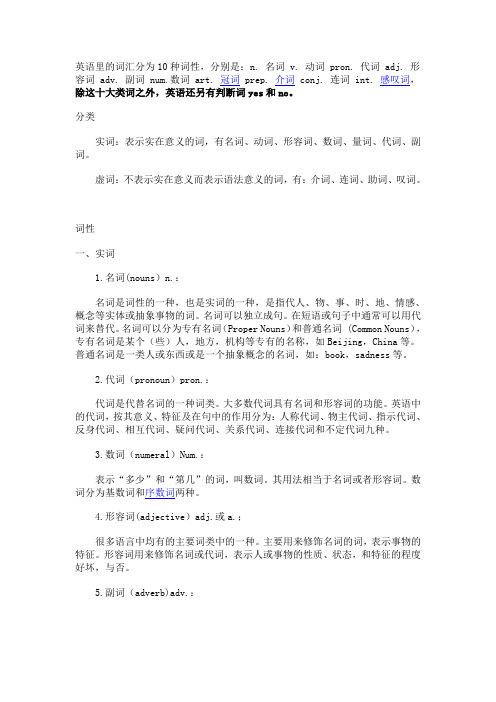
英语里的词汇分为10种词性,分别是:n. 名词 v. 动词 pron. 代词 adj. 形容词 adv. 副词 num.数词 art. 冠词 prep. 介词 conj. 连词 int. 感叹词,除这十大类词之外,英语还另有判断词yes和no。
分类实词:表示实在意义的词,有名词、动词、形容词、数词、量词、代词、副词。
虚词:不表示实在意义而表示语法意义的词,有:介词、连词、助词、叹词。
词性一、实词1.名词(nouns)n.:名词是词性的一种,也是实词的一种,是指代人、物、事、时、地、情感、概念等实体或抽象事物的词。
名词可以独立成句。
在短语或句子中通常可以用代词来替代。
名词可以分为专有名词(Proper Nouns)和普通名词 (Common Nouns),专有名词是某个(些)人,地方,机构等专有的名称,如Beijing,China等。
普通名词是一类人或东西或是一个抽象概念的名词,如:book,sadness等。
2.代词(pronoun)pron.:代词是代替名词的一种词类。
大多数代词具有名词和形容词的功能。
英语中的代词,按其意义、特征及在句中的作用分为:人称代词、物主代词、指示代词、反身代词、相互代词、疑问代词、关系代词、连接代词和不定代词九种。
3.数词(numeral)Num.:表示“多少”和“第几”的词,叫数词。
其用法相当于名词或者形容词。
数词分为基数词和序数词两种。
4.形容词(adjective)adj.或a.;很多语言中均有的主要词类中的一种。
主要用来修饰名词的词,表示事物的特征。
形容词用来修饰名词或代词,表示人或事物的性质、状态,和特征的程度好坏,与否。
5.副词(adverb)adv.:是一种用来修饰动词、形容词、全句的词,说明时间、地点、程度、方式等概念的词。
副词是一种半虚半实的词。
副词可分为:时间副词、地点副词、方式副词、程度副词、疑问副词、连接副词、关系副词、频率副词和说明性副词等。
(完整word版)2019中考英语:动名词专项练习及答案

2019中考英语:动名词专项练习及答案A. repairing B。
repair C. to repair D. repairedA。
to cry B。
crying C. cried D。
cryA。
borrowing; to bring B。
to borrow; bringC。
borrowed; bringing D。
borrowing; bringingA. clean B。
cleaned C. to clean D。
cleaningA。
to wait B。
wait C。
waiting D。
waitedA。
to help B. help C. helping D。
helpedA。
to speak B. spoke C。
speak D. speakingA。
a try B。
try C. triing D。
tryingA. he should go B。
he go C. his going D。
him to goA. couldn’t help laugh B。
can't but laughC. couldn’t help laughingD. couldn’t help but to laughA. copyingB. to copyC. in copy D。
on copyingA. never; thinking of B。
never; thinking aboutC。
not; think of D. don't; think aboutA. being bought B。
buying C。
to buy D。
buying itA。
worth to read B。
worth being readC. worthy to read D。
worthy of being readA. to pickB. pickingC. with pickingD. pluckA。
(完整word版)动名词的用法(完美版).docx

高中英语语法之动名词一、含义动名词兼有动词和名词特征的非谓语动词形式。
基本形式为v-ing,动名词具有名词的性质,因此在句中可以做主语、表语、宾语、定语等。
动名词有时态和语态的变化。
动名词的时态和语态的基本形式:(以 write 为例)时态一般时完成时语态主动语态writing having written被动语态being written having been written 注意:动名词的否定形式是:not writing二、动名词的基本用法1.用作主语---常表抽象,或者泛指习惯性的动作。
Smoking is bad for your health.Playing with fire is dangerous.Swimming is her favorite sport.游泳是她最喜欢的体育运动。
Learning is important to modern life.学习对现代生活很重要。
注意:① 不定式也可以做主语。
不定式与动名词作主语的区别:不定式作主语时经常表示具体的、一次性动作,而动名词作主语时经常表示抽.......象动作或习惯性动作。
Getting up early is a good habit.To get up early this morning made me sleepy.②动名词作主语,有时用it 作形式主语,把动名词置于句末。
It is no use/ good doing...(做。
没有用);It is fun doing... (做。
很有趣);It is a waste of time doing... (做。
是浪费时间)等句型中。
例如:It ’s no use crying over spilt milk.(覆水难收)It is fun playing with children.和孩子们一起玩真好。
It is a waste of time persuading such a person to join us.说服这样一个人加入我们当中来是浪费时间。
(完整word)非谓语动词——动名词
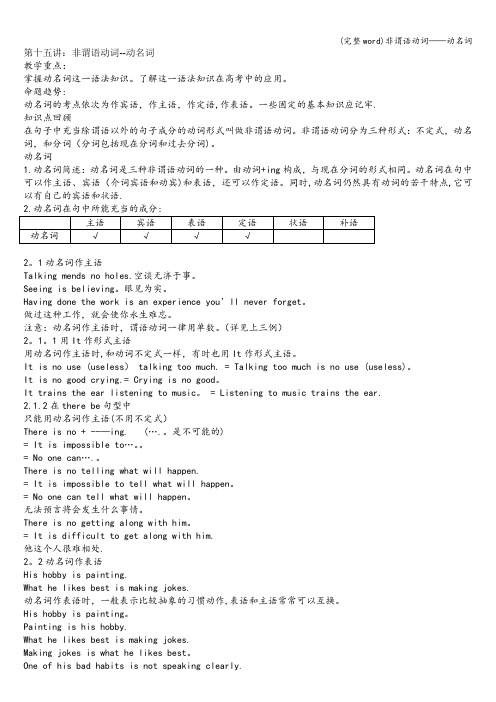
第十五讲:非谓语动词--动名词教学重点:掌握动名词这一语法知识。
了解这一语法知识在高考中的应用。
命题趋势:动名词的考点依次为作宾语,作主语,作定语,作表语。
一些固定的基本知识应记牢.知识点回顾在句子中充当除谓语以外的句子成分的动词形式叫做非谓语动词。
非谓语动词分为三种形式:不定式,动名词,和分词(分词包括现在分词和过去分词)。
动名词1.动名词简述:动名词是三种非谓语动词的一种。
由动词+ing构成,与现在分词的形式相同。
动名词在句中可以作主语、宾语(介词宾语和动宾)和表语,还可以作定语。
同时,动名词仍然具有动词的若干特点,它可以有自己的宾语和状语.2。
1动名词作主语Talking mends no holes.空谈无济于事。
Seeing is believing。
眼见为实。
Having done the work is an experience you’ll never forget。
做过这种工作,就会使你永生难忘。
注意:动名词作主语时,谓语动词一律用单数。
(详见上三例)2。
1。
1用It作形式主语用动名词作主语时,和动词不定式一样,有时也用It作形式主语。
It is no use (useless) talking too much. = Talking too much is no use (useless)。
It is no good crying.= Crying is no good。
It trains the ear listening to music。
= Listening to music trains the ear.2.1.2在there be句型中只能用动名词作主语(不用不定式)There is no + --—ing. (….。
是不可能的)= It is impossible to…。
= No one can….。
There is no telling what will happen.= It is impossible to tell what will happen。
(完整word)高中英语动名词知识点,推荐文档
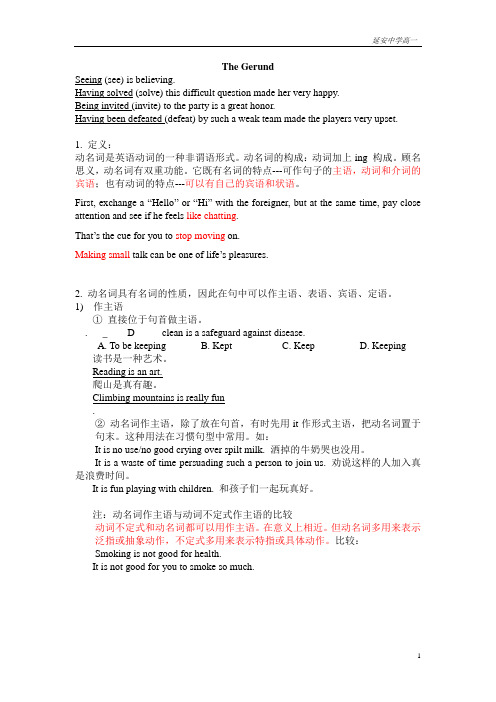
The GerundSeeing (see) is believing.Having solved (solve) this difficult question made her very happy.Being invited (invite) to the party is a great honor.Having been defeated (defeat) by such a weak team made the players very upset.1. 定义:动名词是英语动词的一种非谓语形式。
动名词的构成:动词加上ing 构成。
顾名思义,动名词有双重功能。
它既有名词的特点---可作句子的主语,动词和介词的宾语;也有动词的特点---可以有自己的宾语和状语。
First, exchange a “Hello” or “Hi” with the foreigner, but at the same time, pay close attention and see if he feels like chatting.That’s the cue for you to stop moving on.Making small talk can be one of life’s pleasures.2. 动名词具有名词的性质,因此在句中可以作主语、表语、宾语、定语。
1) 作主语①直接位于句首做主语。
. _____D_____ clean is a safeguard against disease.A. To be keepingB. KeptC. KeepD. Keeping读书是一种艺术。
Reading is an art.爬山是真有趣。
Climbing mountains is really fun.②动名词作主语,除了放在句首,有时先用it作形式主语,把动名词置于句末。
这种用法在习惯句型中常用。
(完整版)介词后 动名词结构一览
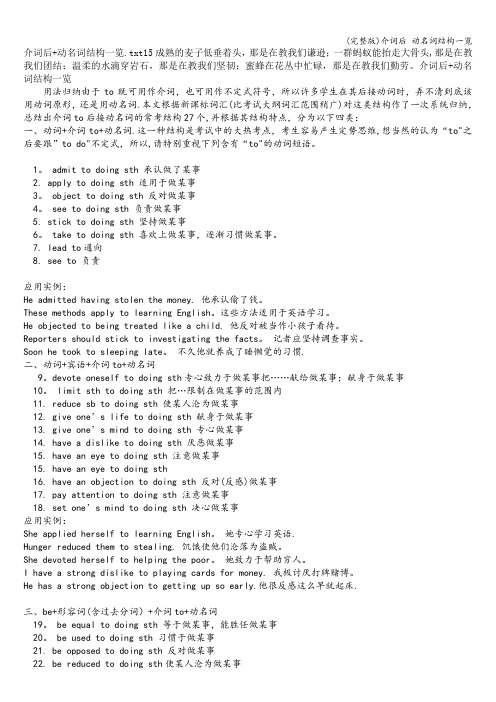
介词后+动名词结构一览.txt15成熟的麦子低垂着头,那是在教我们谦逊;一群蚂蚁能抬走大骨头,那是在教我们团结;温柔的水滴穿岩石,那是在教我们坚韧;蜜蜂在花丛中忙碌,那是在教我们勤劳。
介词后+动名词结构一览用法归纳由于to既可用作介词,也可用作不定式符号,所以许多学生在其后接动词时,弄不清到底该用动词原形,还是用动名词.本文根据新课标词汇(比考试大纲词汇范围稍广)对这类结构作了一次系统归纳,总结出介词to后接动名词的常考结构27个,并根据其结构特点,分为以下四类:一、动词+介词to+动名词.这一种结构是考试中的大热考点,考生容易产生定势思维,想当然的认为“to"之后要跟”to do"不定式,所以,请特别重视下列含有“to"的动词短语。
1。
admit to doing sth 承认做了某事2. apply to doing sth 适用于做某事3。
object to doing sth 反对做某事4。
see to doing sth 负责做某事5. stick to doing sth 坚持做某事6。
take to doing sth 喜欢上做某事,逐渐习惯做某事。
7. lead to通向8. see to 负责应用实例:He admitted having stolen the money. 他承认偷了钱。
These methods apply to learning English。
这些方法适用于英语学习。
He objected to being treated like a child. 他反对被当作小孩子看待。
Reporters should stick to investigating the facts。
记者应坚持调查事实。
Soon he took to sleeping late。
不久他就养成了睡懒觉的习惯.二、动词+宾语+介词to+动名词9。
devote oneself to doing sth专心致力于做某事把……献给做某事;献身于做某事10。
(完整版)初中英语语法专练动名词Word版含答案
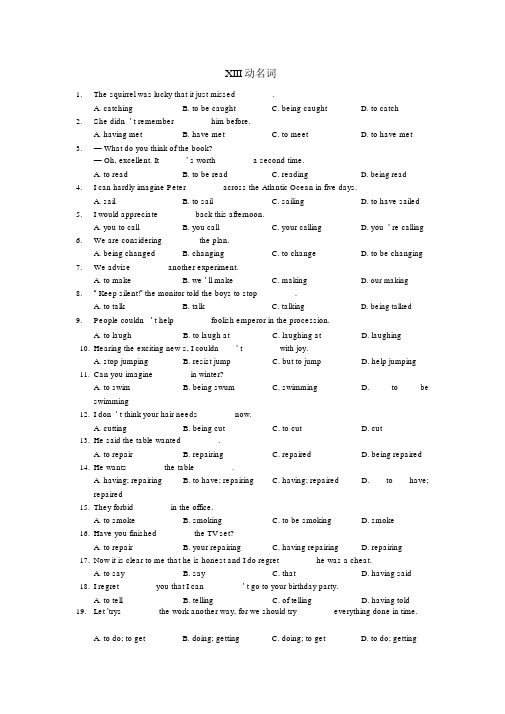
XIII动名词1.The squirrel was lucky that it just missed ________.A. catchingB. to be caughtC. being caughtD. to catch2.She didn ’ t remember ________him before.A. having metB. have metC. to meetD. to have met3.—What do you think of the book?—Oh, excellent. It’ s worth ________a second time.A. to readB. to be readC. readingD. being read4.I can hardly imagine Peter ________across the Atlantic Ocean in five days.A. sailB. to sailC. sailingD. to have sailed5.I would appreciate ________back this afternoon.A. you to callB. you callC. your callingD. you ’ re calling6.We are considering ________the plan.A. being changedB. changingC. to changeD. to be changing7.We advise ________another experiment.A. to makeB. we ’ ll makeC. makingD. our making8.“ Keep silent!” the monitor told the boys to stop ________.A. to talkB. talkC. talkingD. being talked9.People couldn ’ t help ________foolish emperor in the procession.A. to laughB. to laugh atC. laughing atD. laughing10. Hearing the exciting new s, I couldn ’ t ________with joy.A. stop jumpingB. resist jumpC. but to jumpD. help jumping11. Can you imagine ________in winter?A. to swimB. being swumC. swimmingD. to beswimming12. I don ’ t think your hair needs ________now.A. cuttingB. being cutC. to cutD. cut13. He said the table wanted ________.A. to repairB. repairingC. repairedD. being repaired14. He wants ________the table ________.A. having; repairingB. to have; repairingC. having; repairedD. to have;repaired15. They forbid ________in the office.A. to smokeB. smokingC. to be smokingD. smoke16. Have you finished ________the TV set?A. to repairB. your repairingC. having repairingD. repairing17. Now it is clear to me that he is honest and I do regret ________he was a cheat.A. to sayB. sayC. thatD. having said18. I regret ________you that I can ’ t go to your birthday party.A. to tellB. tellingC. of tellingD. having told19.Let ’trys ________the work another way, for we should try ________everything done in time.A. to do; to getB. doing; gettingC. doing; to getD. to do; getting20. Oh, by the way, do you mind ________a letter for me?A. postingB. to postC. your postingD. if you can post21. It ’ s a good habit ________aloud early in the morning.A. practice to readB. to practice readingC. practicing to readD. to practice andread22. As you know, studying means ________hard.A. workB. to workC. workingD. that we work23. The floor requires________, so the students are required ________the work.A. washing; to doB. to wash; doingC. washing; doingD. to wash; to do24. The lake is polluted. We don ’ t allowed ________here.A. swimmingB. to swimC. anyone swimD. for anyone toswim25. Why have they delayed ________the sports meet?A. holdB. holdingC. to holdD. having held26. The doctor advised the old man to give ________drinking.A. inB. offC. outD. up27. He went on ________until everyone was bored.A. to talkB. talkingC. with talkD. the talk28. On the way home Bill ________on ________his father such a lot of questions.A. kept; to askB. continued; to askC. kept; askingD. continued;asking29. Have you decided to put off ________to Shanghai?A. to goB. to leaveC. goingD. leaving30.—What are you going to do this afternoon?—I’ m thinking of ________to visit my aunt.A. goB. goingC. having goneD. my going31. The naughty boy was afraid ________by his teacher.A. to scoldB. to be scoldingC. of scoldingD. of beingscolded32. He insisted ________a picture for the wall newspaper.A. I would drawB. me to drawC. my drawingD. on my drawing33. There is still hope ________the ticket.A. our buyingB. of our buyingC. to us buyingD. for buying34. Have you made any plan for ________the day?A. congratulatingB. you congratulatingC. celebratingD. you celebrating35. Modernization is the key ________up our agricultural development.A. to speedB. of speedingC. for speedingD. to speeding36. ________home, he went to bed.A. To reachB. As soon as reachedC. On reachingD. In reaching37. They hurried on for fear ________.A. to catch the rainB. of catching the rainC. to be caught in the rainD. of being caught in the rain38. The man will die ________at once.A. not to operateB. without operate on himC. if don’ t operateD. without being operated on39.I think the book worthy ________.A. readingB. to readC. of being readD. of reading40.He used to ________cards with his friends, but now he is used to ________a walk after supper.A. play; takingB. playing; takeC. play; takeD. playing; taking41. We look forward to ________a trip to Hangzhou.A. makeB. makingC. be onD. go on42. He doesn ’ t feelkeli ________to the exhibition today.A. to goB. goingC. comeD. that he is43. After cooking, Mother ________making tea.A. set outB. set aboutC. set offD. start off44. She’ s got used ________English in the morning.A. to readB. readingC. to readingD. to be reading45. She takes great pleasure ________other.A. to helpB. in helpingC. by helpingD. with helping46. It ’ s cold; do you mind ________the window?A. for me to closeB. if I closeC. whether I closeD. your closing47. ________in the examination made her parents very angry.A. Sue failingB. Sue ’ s failC. Sue ’ s failing d. Sue to havefailed48. ________staying up so late is bad for his health.A. He ’sB. HisC. HeD. Him49. I don ’ t like strangers ________to our talk.A. listeningB. listenC. hearingD. hear50. Father suggested ________an umbrella.A. me to take b. for me to take C. my taking D. I must take51. She was afraid of ________to see her.A. Peter ’ s not goingB. not Peter ’ s goingC. Peter’ s doing not goD. Peter going not52. I understand ________to go to the meeting.A. whoB. whenC. your not wantingD. not yourwanting53. ________to help was a great encouragement to us.A. They comingB. They comeC. Their comeD. Their coming54. I can ’ t excuse her ________like that.A. talkingB. to talkC. talkD. being talked55. Behind the ________there is a big ________.A. writing desk; looking glassB. written desk; looking glassC. writing desk; looked glassD. written desk; looked glass56. We must do something to prevent the lake ________.A. to be pollutedB. from pollutingC. off being pollutedD. being polluted57. They would rather spend time ________than ________in the street.A. studying; wanderingB. studying; wanderC. to study; wanderingD. to study;wander58. There is no use ________it any further now.A. our discussingB. for us to discussC. we discussingD. of us to discuss59. ________newspapers every day can add to one ’ s common sense.A. ReadingB. ReadC. By readingD. If reading60.—What made you so worried?—________the plane.A. Because I missedB. Because of missingC. I missedD. Missing1— 10. CACCC BCCCD 11—20. CABDB DDACA 21— 30. BCAAB DBCCB 31— 40. DDBCD CDDCA 41— 50. BBBCB BCBAC 51— 60. ACDAA DBAADIX 被动语态和短语动词1.You ________on the phone.A. wantB. are wantedC. are wantingD.are beingwanted2.The 11th Party Congress ________in August 1977.A. was heldB. heldC. is heldD. holds3.________to attend the memorial meeting?A. Shall we askB. Shall we be askingC. shall we be askedD. Shall be weasked4.The machine is ________in the school factory.A. been repairedB. been repairedC. being repairingD. being repaired5.Chairman Mao ’ s works ________into scores of languages since 1958.A. have translatedB. were translatedC. have been translatedD.has beentranslated6.I haven ’ t seen him for a week. He ________that day.A. must be woundedB. must have been woundedC. must woundD. must have wounded7.Another building is going ________right beside the office building.A. to buildB. to be buildingC. to being builtD. to be built8.In a sense, bad things ________into good things.A. can be turnedB. can have turnedC. can turnD. can be turning9.The question ________in.A. needn ’ t broughtB. needn ’ t be broughtC. needn’ tto be broughtD. needn ’ t bring10.These blood debts will have ________in blood.A. been paidB. to payC. paidD. to be paid11.These criminals are sure________.A. to punishB. to be punishingC. to punishedD. to be punished12.These broken-down cars are ________next monthA. repairedB. repairingC. being repairedD. to be repaired13.Have the doctors________?A. been sent forB. sent forC. been sending forD. being sent for14.The question has been much ________recently?A. talking aboutB. talked aboutC. talkingD. talked15.For this he has been ________twice.A. operating onB. operated onC. operateD. operated16.So far no conclusion________.A. was arrivedB. was arrived atC. has been arrivedD.has beenarrived at17.The English evening has ________till Friday.A. put offB. called offC. been put offD. been called off18.Lots of new words have ________.A. to be lookedB. to be looked upC. to look upD. looked up19.Women ________in the old days.A. were looked down uponB. were looked downC. had been looked down uponD. had been looked down20.Which of the following is not correct?A.They were given a warm send off at the airport.B.A warm send off was given to them at the airport.C.A warm send off was given them at the airport.D.They were given to a warm send off at the airport.21.Many cities became ________in the following months.A. liberationB. liberatingC. liberateD. liberated22.The book ________. We all like it very much.A. was well writtenB. well written writeC. is well writtenD. well wrote23.He ________to going to bed early.A. has got usedB. has usedC. has been usingD. has using24. A quarrel ________between Xiao Hong and Xiao Fang last night.A was broken out B. broken out C. broke out. D. is broken out25.This kind of cloth ________very well.A. washesB. is washedC. washedD.is beingwashed26.It ________that the meat cooks well.A. seemsB. is seemedC. was seemedD. seemed27.She is a very nice person ________.A. to be worked withB. to be working withC. to work withD. working with28.The boy ________stealing a pocket-radio from the shop.A. caughtB. was caughtC. caught inD. was catching in29.Brooke is so lazy that he ________very soon.A. is said to be fired C. says to be firedB. is said that he was fired D. is said to fire30.He insisted on ________to work in the poor countryside.A. sendingB. being sendingC. to be sentD. being sent31.The house was ________last night and the color TV set was stolen.A. broken outB. broken intoC. broken downD. broken away32.Though he ________, he still ________his theory.A. has laughed; stuck toB. was laughed at; was stuck toC. was laughed; was stuck toD. was laughed at; stuck to33.Frank is the kind of person whom people like to ________.A. make friend withB. make friends ofC. make friends byD. make friendswith34.I ________play the violin than the piano.A. would ratherB. had rather toC. would betterD. prefer to35.Would you mind ________your radio a little, please?A. turn overB. turn offC. to turn onD. turning down36.When you come to Wuhan, I can ________the night.A. put you up toB. put you down forC. put you toD. put you for37.She ________Robert for a year.A. has been married withB. married withC. married toD.has beenmarried to38.She ________seeing a dead dog.A. was terrified atB. was terrified inC. was terrified forD. was terrifiedwith39.I was ________as a worker in another factory.A. taken forB. taken toC. taken outD. taken on40.When he first ________ story telling, he used to ask many children to come and listen.A. took downB. took overC. took upD. took trouble in41.He ________a bus slowing down before the shop.A. caught sight ofB. caught the sight ofC. caught sight forD. caught his sight42.Then they ________home.A. set outB. set out forC. set offD. set about to43.In order to ________the gun it is necessary to taken up the gun.A. get out ofB. get along withC. get down forD. get rid of44.The guide ________to us all the objects of interest.A. pointed outB. pointed atC. pointed offD. pointed down45.We ________with that factory ________200 machines.A. made an order; forB. placed an order; forC. made an order; onD. placed an order; on46.Our class is ________forty boys and twenty two girls.A. made up forB. made use forC. made best ofD. made up of47.She will ________my troubles as well as my joys.A. spend inB. spareC. share withD. share48. The living conditions here don ’ t ________me.A. agree toB. fit forC. agree withD. fit with49.Sometimes they ________referees ( 调停员 ).A. acted asB. acted outC. acted forD. acted on50. She gave many excuses, but what they ________was that she didn ’ t want to come.A. added upB. added toC. added up toD. add up with51.The Red Army ________after the defeat of the first great revolution.A. came into beingB. came into forceC. came into officeD. come into use52.Luckily, he ________these people years ago.A. broke intoB. broke outC. broke away fromD. broke downfrom53.Would you ________a cup of coffee?A. care withB. care forC. care aboutD. care of54.Mao Zedong ________fighting for the bright future of China.A. was devoted toB. devoted toC. was devoted forD.devotedhimself for55.Led by Fang Zhimin, we ________northern Jiangxi.A. made our ways toB. made our way toC. got our way toD. made room for56. Zhu De was a person who always ________.A. kept his wordB. kept upC. got in a wordD. kept in mind57. We must learn to ________a bad job.A. made best ofB. make the best ofC. make sureD. make fun of58. When the war broke out they ________at once.A. were called forB. were called offC. were called upD. were called out59. The plan ________more careful work at preventing forest fires.A. called inB. called onC. called upD. called for60. The workers would ________the struggle for freedom and happiness.A. call onB. carry offC. call toD. carry on1— 10. BACDC BDABD 11— 20. DDABB DCBAD21—30. DCACAACBAD31— 40. BDDAD ADADC 41— 50. ABDAB DDCAC 51— 60. ACBAB ABCDD。
(完整word版)英语语法大全,推荐文档.doc

英语语法大全下载1、所有格: He is Fred's best friend. ( -'s )2 、动词现在时的第三人称单数: Alfredo works. ( -s )3 、动词过去式: Fred worked . ( -ed ),但亦有不规则变化。
4 、现在分词/进行时态: Fred is working . ( -ing )([注]如果动词的末音节为辅音结尾的闭音节,则须双写末辅音,如running )5 、过去分词: The car wasstolen . ( -en ); Fred has talked to the police. ( -ed ),但亦有不规则变化。
6 、动名词: Working is good for the soul. ( -ing )7 、名词的复数: Fred has two blue eyes . ( -s )([注]如果动词的尾字是s,sh,x,ch ,则需加 -es ,如 dishes )8 、形容词的比较级: Fred is smarter than Rick. ( -er )形容词末尾加-er ,多音节在前面”加more ,如 " more difficult " 。
9 、形容词的最高级:Fred has the fastest car. ( -est )形容词末尾加-est ,多音节词在前面加most ,如 " the most difficult " 。
英语的基本语序为 SVO,且基本上不能任意变换语序,除了在少数诗词以外;另一方面,有时英语会使用OSV的语序。
(注:S: Subject [主语]; V: Verbal phrase [谓语]; O: Object [宾语])英语中所有的词可分成十大类,每一类词在句子中都有其特定的位置和作用。
这十大词类是:一、名词:表示人或事物的名称的词。
动名词Microsoft Word 文档

动名词一.动名词的用法。
Ving1.记住别人的名字对我而言是困难的。
Rem embering others’nam es is difficult for me。
=It is difficult for m e to rem ember others’ nam es。
(或other people’s nam es)1.冬天最好的运动是滑雪。
The best exercise in winter is skiing(ski)2.One Am erican tradition is eating turkey(火鸡肉)on Thanksgiving Day.不定词当补语表示:目的计划意愿…动名词当补语表示:经验已知的事…His hobby is fishing in the lake。
(嗜好)1.你必须放弃旅行。
You have to give up traveling。
2.我父亲很喜欢打高尔夫球。
My father enjoys playing golf very m uch.3.那老人一直站着。
The old m an kept standing all the while(或tim e)#介词+N/Ving1.他因为上学迟到而挨骂。
He got (连缀动词)scolded for being late to school(上学迟到be late to school)2.他一句话都没说就离开了房间。
He left the room without(介词没有不曾缺少)saying a word。
下列句子中的to为介词,其后接动名词1.我期待再次见到你。
I’m looking forward to seeing you again(期待look forward to)2.我习惯早起。
I am used to getting up early。
{现在的习惯:be+used to过去的习惯:used to+VR}3.他贡献了他的一生在非洲医治病患。
(完整word版)英语动词的分类和用法
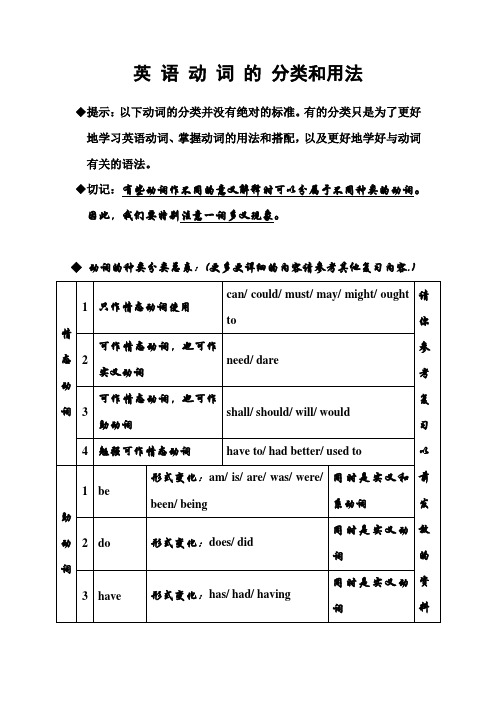
词4
动词
lie/ stand/ stay
意思不同。请注
变 化 系 become / grow/ turn/ go/ get/ fall/ 意 结 合 句 意 去
5 动词
come/ run
理解判断。
终止系
6 动词
prove/ turn out
实
本身意义完整后面不须跟宾语 有 不 少 的 动 词 第
不及物动词 的实义动词。
A.表示“使、令、让、叫…”等意义的动词. 如: make,
使 have, let, get, keep…
第4页
役 B.表示“使人……,令人……”的心理状态的动词。 有更多
3
动 如:
相关内
词 interest; excite; astonish; move; amuse; 容.
surprise……(+ sb.)
动 C. 表示心理状态或情感 词 状态的动词
suppose; feel; think; find; forget; hate; hope; imagine; know; like;
love; mind; realize; regret; suppose;
understand; want; wish…… 2
同时是情态动 词
5 will
形式变化:would
同时是情态动 词
状态系
1
be
动词
表像系
2 动词
look / appear/ seem
特别说明: 这里列举的所
感官系
有系动词本身
系3 动词
feel / smell/ sound/ taste
都是实义动词。
动
持 续 系 keep/ rest/ remain/ continue/ last/ 但 它 们 表 示 的
完整word版小学英语动名词
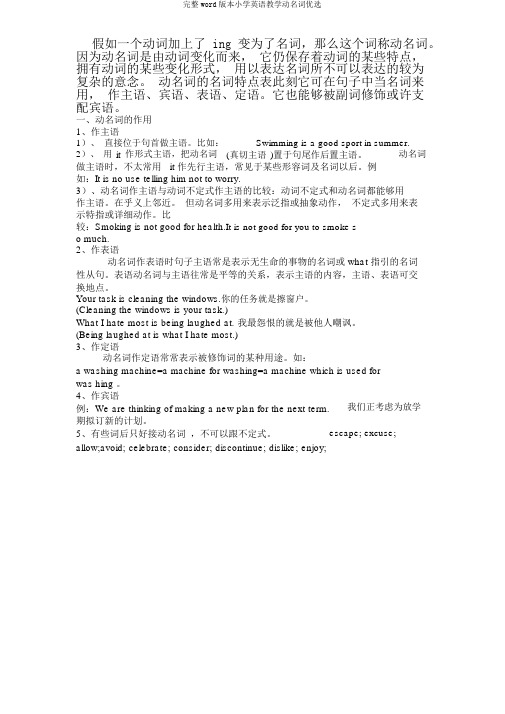
假如一个动词加上了 ing 变为了名词,那么这个词称动名词。
因为动名词是由动词变化而来,它仍保存着动词的某些特点,拥有动词的某些变化形式,用以表达名词所不可以表达的较为复杂的意念。
动名词的名词特点表此刻它可在句子中当名词来用,作主语、宾语、表语、定语。
它也能够被副词修饰或许支配宾语。
一、动名词的作用1、作主语1)、直接位于句首做主语。
比如:Swimming is a good sport in summer.2)、用it作形式主语,把动名词(真切主语)置于句尾作后置主语。
动名词做主语时,不太常用it 作先行主语,常见于某些形容词及名词以后。
例如:It is no use telling him not to worry.3)、动名词作主语与动词不定式作主语的比较:动词不定式和动名词都能够用作主语。
在乎义上邻近。
但动名词多用来表示泛指或抽象动作,不定式多用来表示特指或详细动作。
比较:Smoking is not good for health.It is not good for you to smoke so much.2、作表语动名词作表语时句子主语常是表示无生命的事物的名词或 what 指引的名词性从句。
表语动名词与主语往常是平等的关系,表示主语的内容,主语、表语可交换地点。
Your task is cleaning the windows.你的任务就是擦窗户。
(Cleaning the windows is your task.)What I hate most is being laughed at. 我最怨恨的就是被他人嘲讽。
(Being laughed at is what I hate most.)3、作定语动名词作定语常常表示被修饰词的某种用途。
如:a washing machine=a machine for washing=a machine which is used forwas hing 。
- 1、下载文档前请自行甄别文档内容的完整性,平台不提供额外的编辑、内容补充、找答案等附加服务。
- 2、"仅部分预览"的文档,不可在线预览部分如存在完整性等问题,可反馈申请退款(可完整预览的文档不适用该条件!)。
- 3、如文档侵犯您的权益,请联系客服反馈,我们会尽快为您处理(人工客服工作时间:9:00-18:30)。
动名词一、动名词及动名词短语的构成2.否定式:not +动名词(doing)的各种形式3.动名词的复合结构动名词具有动词的特征,因此它可有自己的逻辑主语。
如果需要指出动名词动作的发出者,可在动名词前加一物主代词、名词所有格、名词或人称代词宾格来修饰,表示动名词逻辑上的主语,这样就构成了动名词的复合结构。
1.Do you mind my(me) making a suggestion?2.Their coming to help was a great encouragement to us.3.My daughter’s staying up so late worried me.4.I know nothing about the window being open.5.Are you disappointed at there not being more gifts?6.She was awakened by someone knocking at the door.二、动名词的句法功能(一)动名词作主语1.动名词作主语多表示经常性的、习惯性的动作。
1.Swimming has its laws.2.Talking mends no holes.空谈无济于事。
3.Learning without practice is no good.2. 动名词作主语,有时句中使用形式主语it而将真正主语(动名词)放到句尾。
常用的结构有:It is +n. + doing.It is + adj. + doingThere is (was) no doingIt is no use writing to him; he never answers letters.It is good playing chess after supper.There is no holding back the wheel of history.适用于It is以上结构的名词(短语)有:no use, no good, fun, a waste (of time), a great pleasure, 等形容词有:useless, nice, good, interesting, worthwhile, foolish, dangerous 等。
如:It is no good learning without practice.It is a waste of time (worthwhile) discussing such matters.3.句型“There be +doing”中做主语,用于说明“不允许、禁止某种活动或是某件事情的发生或存在"。
类似一种建议、命令等。
1) There is no joking about such matters .2) There is no denying the fact that China has made a rapid progress in every aspect since it was founded .不容抵赖这个事实,中国自它成立以来已在各个方面都取得了飞速的发展。
3) There is no littering about .不许乱扔杂物。
(二)动名词作宾语动名词(短语)作宾语包括作谓语动词的宾语和作介词的宾语两个概念。
1.作介词的宾语:She left without saying goodbye to us.He insisted on watching the football game.They succeeded in getting over all the difficulties.They all objected to putting the meeting off.2.在一些动名词(短语)作介词in的宾语的结构中,介词in可以省略。
这些结构有:1)difficultytroubleS+ have+ problem + (in) doing ….a good/hard timefun2)There is no point (in) doing sth..3) be busyS+ lose… time + (in) doing….waste… time4) S + spend time / money (in) doing sth.3.to是介词的短语be accustomed to(习惯), be opposed to(反对), be reduced to(沦为,降为),be sentenced to (判决),get down to(着手开始),object to(反对),give rise to(使...发生),stick to(坚持),stand up to(勇敢面对)4. 与动词不定式相似,动名词作宾语也是由一些及物动词专门要求的。
常要求作宾语的动词有:常跟动词ing作宾语的动词歌诀:考虑建议盼原谅,consider, suggest / advise ,look forward to ,excuse ,pardon承认推迟没得想,admit, delay / put off , fancy避免错过继续练avoid , miss ,keep /keep on , practise否认完成停能赏,deny , finish , stop ,enjoy / appreciate不禁介意准逃亡,can’t help , mind , allow/ permit ,escape不准冒险凭想象。
forbid , risk , imagine有些动词后面既可接动名词也可接不定式,但含义不同。
如:•regret to do: 抱歉/遗憾要去做某事•regret doing: 后悔做了某事•forget to do: 忘记去做某事•forget doing: 忘记做过某事•remember to do: 记得要做某事•remember doing: 记得曾经做过的事•mean to do: 打算做某事•mean doing: 意味着做某事•try to do: 努力做某事•try doing:尝试做某事•can’t help to do 不能帮助做某事•can’t help doing 忍不住做某事•stop to do:停下来去做另外一件事•stop dong: 停止/不做某事•go on to do: 接着做另一件事•go on doing: 继续做同一件事5.在带有宾补的结构中,往往用it作形式宾语而将真正宾语(动名词)放在句尾。
thinkconsider uselessS + find it+ no use + doingfeel like no goodetc.1.I consider it a waste of time arguing about it.2.We found it useless discussing it again.3.I don’t think it worthwhile doing it right now.6.在want, need, deserve, require 等动词及形容词worth后,总是用动名词的主动形式表示被动意义,相当于“to be +过去分词”。
1.My watch needs repairing (=to be repaired).2.The house wants cleaning.3.The way deserves mentioning. 这个方法值得一提。
4.These young trees will require looking after carefully.5.The Selected Poems is well worth reading.(三)动名词作表语动名词(短语)作表语用来表示主语的内容。
1.Her job is nursing patients.1.My favorite summer sport is swimming.(四)动名词作定语动名词作定语放在所修饰的名词之前,表示所修饰的名词的功能、作用。
1.These passages may be used as listening materials.2.Mr. Wang suffers from insomnia(失眠), he has to take a sleeping tablets before goingto bed.3.He is too old and has to walk with the help of a walking stick.三、动名词的时态(一)、一般式(doing)动名词一般式所表示的动作通常与谓语动词所表示的动作同时发生或在谓语动作之后发生。
1.By reviewing the old, you can learn something new.2.Some people are interested in singing.3.Children enjoy watching animated cartoon.某些动词后,动名词所表示的动作虽然发生在谓语动作之前,但仍用动名词的一般式。
I don’t remember ever seeing her anywhere.He mentioned meeting the governor at the reception.(二)、完成式(having done)动名词的完成式所表示的动作在谓语动作之前发生。
1.I regret having been unable to write you earlier.2.He denied having taken any money from the cash register.3.I apologize for not having kept my promise.4.We have no idea of their having done such a thing.四、动名词的被动语态(一)一般式(being done)当一个动名词逻辑上的主语所表示的是该动作的对象(即动名词所表示的动作与逻辑主语有动宾关系)时,动名词一般要用被动式。
1.He came in without being asked.2.I don’t mind being left home all by myself.3.He disliked being interrupted in his experiment.4.Tom avoided being punished because of his father’s absence.5.Before being used, the computer should be tested.(二)完成式(having been done)如果动名词所表示的被动动作在谓语所表示的动作之前发生,有时需要用动名词的完成被动式。
